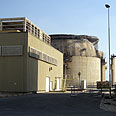
Nuclear reactor in Bushehr, Iran
צילום: רויטרס
Officials: World power meeting on Iran canceled
Setback in efforts to present unified front against Tehran's nuclear program as China asks to cancel meeting of five world powers, citing scheduling problems. In Vienna, Defense Minister Barak urges world to agree to tough new sanctions while suggesting that military strikes remain an option
An upcoming meeting by five world powers on trying to curb Iran's nuclear program has been canceled on China's request, senior officials from three of the countries involved said in ViennaMonday.
One of the officials said China cited scheduling problems in asking for the cancellation, and the five now plan to talk by conference call.
The official said China seemed to have genuine problems in attending the meeting in Brussels or outside the Copenhagen climate summit and did not appear to be seeking to delay it. Still, the development was a setback in efforts to present a unified front on Iran in the face of continued Iranian defiance on its nuclear program.
Because it relies on Tehran for gas and oil, China is the weakest link in international attempts to punish Iran for defying a UN Security Council demand that it stop enriching uranium, a process that can make both nuclear fuel and the fissile core of warheads.
The world powers also have to worry about an increasingly edgy Israel. The Jewish state sees an Islamic Republic with such weapons as an existential threat, and has indicated it is ready to hit Tehran militarily.
Israeli Defense Minister Ehud Barak urged the world to agree to tough new sanctions while suggesting that military strikes remained an option.
"There is a need for tough sanctions," Barak told reporters in Vienna during an official visit. "Something that is well and coherently coordinated to include the Americans, the EU, the Chinese, the Russians, the Indians."
At the same time, he said, "we recommend to all players not to remove any options from the table," just as "we do not remove it."
During seven years of failed international diplomacy, Iran has moved closer to being able to make nuclear arms, even while insisting that its atomic program is meant solely to generate energy.
Barak: Nuclear Iran will initiate nuclear competition
Its thousands of centrifuges have produced enough enriched uranium to produce two nuclear weapons, even though it maintains the stockpile will only be used for nuclear fuel and not for weapons-grade material.
It has only recently _ and belatedly _ revealed that it is building a second enrichment site and is stonewalling an International Atomic Energy Agency probe of allegations that it had experimented with making nuclear weapons.
Iran threatened this month to expand its enrichment program tenfold, while rejecting an IAEA-brokered plan to supply fuel for its research reactor if Iran exports of most of its enriched stockpile, a move that would strip it of its warhead material.
The US, France and Britain, the three Western permanent UN Security Council members, are trying to persuade Russia and China to back new and tough Security Council sanctions on Tehran as early as the start of next year, should other diplomatic options fail.
But Russia in recent days has moved away from suggesting it would support such a move. And recent statements from Chinese officials indicate that Beijing has not changed its traditional opposition to new sanctions.
While Russia and China signed on to three previous sets of UN sanctions against Iran, they also forced their Western Security Council partners to water them down substantially.
China's balancing act on Iran reflects its global strategy of trying to insert itself into the US-led world order, working with Washington when it can, and opposing US policies when they conflict with its own.
The White House has said Iran has until the end of the month to accept that IAEA-brokered proposal for a swap of most of its enriched stockpile for research reactor fuel, and Barak suggested that Israel was willing to give the US more, but not indefinite, time in mixing outreach toward Iran with the threat of further sanctions.
"There should be a time limit for all these attempts to block them through sanctions," he told reporters, warning that an Iran armed with nuclear weapons "will clearly ... initiate a nuclear competition."
"Think of Egypt, or Turkey or Saudi Arabia," he said. "They can hardly afford not being nuclear if Iran turns ... nuclear."










